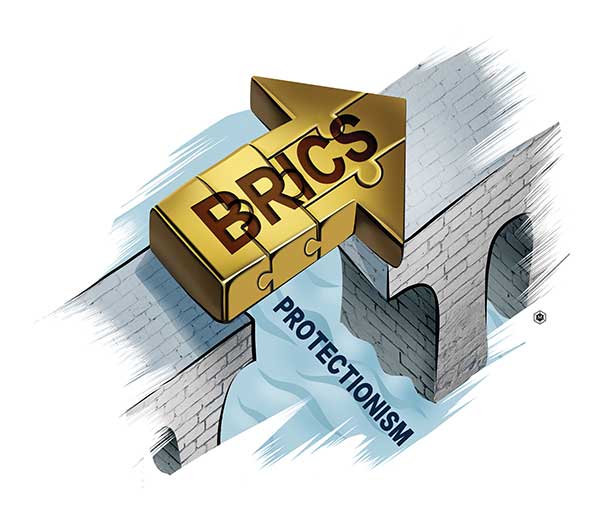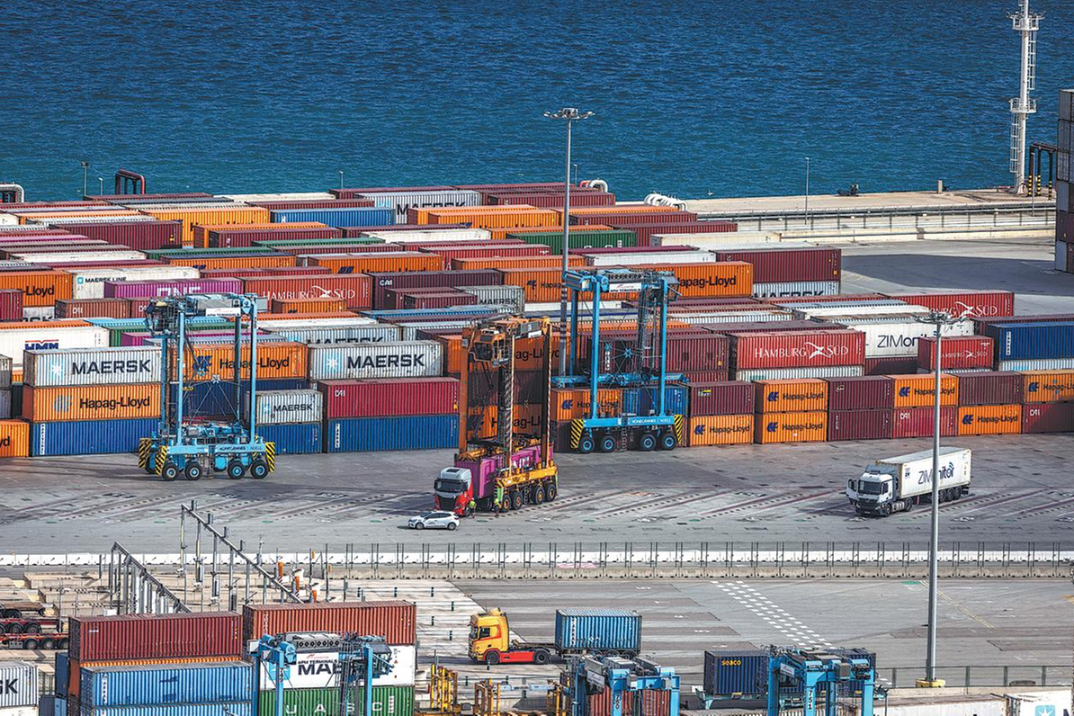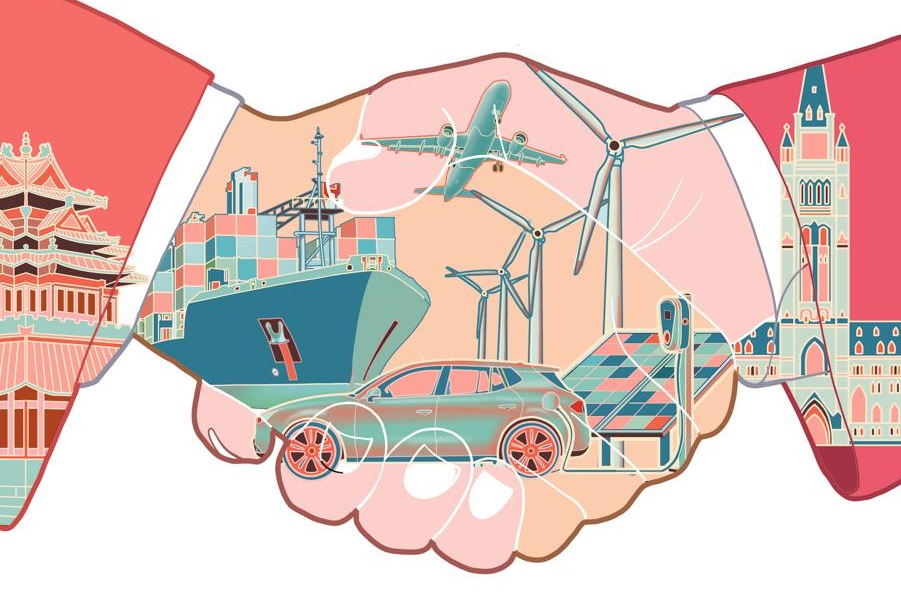BRICS leaders reiterate multilateralism, oppose protectionism


The 10th BRICS summit in Johannesburg, capital city of South Africa, clearly sent the open message that there is no alternative to economic globalization and multilateralism. The essence of the summit was that existing global challenges on many sectors could only be overcome through deep cooperation and comprehensive dialogue. Now the world is facing extremely desperate economic challenges, which could severely affect people’s social and economic lives. The foremost challenge for global leaders is how to raise hope for economic growth and development among global communities.
BRICS is an alliance of the major economic countries of Brazil, Russia, India, China and South Africa. Goldman Sachs economist Jim O’Neil initially formulated the acronym BRICs in 2001. South Africa joined in 2010 and BRICs was replaced by the term BRICS. O’Neil stated in his global economic growth report that BRICS countries have huge potential to become the dominant economies by the year 2050. Currently, these countries cover 30 percent of the world’s land and 40 percent of the world’s population. According to a report from Goldman Sachs, BRICS countries hold a combined GDP of $25 trillion and are among the biggest and fastest-growing emerging markets. Though not openly specified, after reading the formal documents from BRICS summits, it is not hard to recognize that they are enhancing better cooperation and want to establish a more balanced new world order based on mutual trust and harmony.
According to the World Bank report of 2013, by 2030 two-thirds of global savings and investment will be in developing countries, compared with one-fifth in 2000. Similarly, according to the 2013 report of the Organization for Economic Cooperation and Development (OECD), China and India together will be larger than the whole OECD economy by 2025. On one hand, the post-World War II global order has accelerated this present revolution in development achievements and prospects. At the same time, a major adjustment of global governance arrangements will be required, as a functional matter. And undeniably this adjustment is already proceeding. Experts opined that the materialization of the BRICS summit procedure is to be seen as part of the adjustment.
With the launch of the BRICS community, China has always been promoting and contributing to the enhancement of globalization and comprehensive dialogue as a tool to resolve persistent issues. Addressing a BRICS summit in Johannesburg, Chinese President Xi Jinping said, “BRICS member countries should deepen their strategic partnership and enhance cooperation in areas such as trade, investment, finance and interconnectivity.” President Xi further stressed safeguarding the multilateral trading system under the framework of the United Nations, G20 and the World Trade Organization. At the summit, China said that from its side it would do all to carry out a project to enhance human resources cooperation, invite experts from the five countries to draft a blueprint for working together in a new industrial revolution, and improve the competitiveness of emerging markets and developing countries.
Now the world is on the verge of a transition. There is huge demand to reform the old Bretton-Woods institutions and formulate new institutions as well to address global challenges and requirements. In the new circumstances, it is very significant to continue innovation-driven development and strengthen coordination on macroeconomic policies. This is also vital to overcome the north-south development imbalances.
No doubt BRICS member countries are leading emerging economies and political powers at the regional and international level. Due to their geographical and demographic dimensions, BRICS economies have capacities for influence in all the least-developed, developing and developed areas of the world. Every BRICS summit displays the approach of increasing coordination on multilateral levels with a focus on economic and political governance and promoting cooperation between members and the rest of the world. In all BRICS summits, the issues of reforming structures of global governance, particularly in economic and financial fields, the G20, International Monetary Fund (IMF), and World Bank receive special importance, as well as the reform of political institutions, such as the United Nations.
BRICS member countries have also succeeded in expanding areas of cooperation comprising finance, agriculture, economy and trade, combating transnational crime, science and technology, health, education, corporate and academic dialogue and security, among others. The New Development Bank was established after the sixth BRICS summit, which aimed at financing infrastructure and sustainable development projects. Likewise, BRICS also concluded the agreement that creates the Contingent Reserves Arrangement (CRA), a fund with an initial sum of $100 billion, which the BRICS countries will be able to use to forestall short-term liquidity pressures. Actually, the establishment of the NDB, CRA and Asian Infrastructure and Investment Bank (AIIB) have conveyed a strong message of the willingness of BRICS members to deepen and consolidate their partnership in the economic-financial area.
In the Johannesburg summit, President Xi also focused on BRICS Plus cooperation as an opportunity to build an open, inclusive, cooperative and win-win partnership and create a platform for deepening South-South cooperation. Reading the Johannesburg Declaration of the 10th BRICS summit, we can summarize that all BRICS parties assumed that under the current circumstances, with the challenges of rising unilateralism and protectionism, it is very essential to strengthen solidarity and cooperation between emerging markets and developing countries, and also to jointly oppose unilateralism and protectionism, in order to gain inclusive growth, sustainable development and benefits to all.
Now BRICS are in a strong position, using their economic strength to induce change, which is challenging the traditional Western-dominant world order. It is not hard to understand the declared spirit of the Johannesburg summit that reform of international financial and economic institutions and the promotion of polycentric and multipolar systems are major concerns of the BRICS member countries. Similarly, they have to face growing demand of the underdeveloped and developing world to vehemently contribute to a more just, balanced and inclusive world.
The author is a PhD candidate at Communication University of China. He is also president of Himalaya Dialogue and Leadership Foundation, HDLF.
The views do not necessarily reflect those of China Daily and chinadaily.com.cn.


































